“The year 2022, which gave the album its name, ended up feeling like an artist’s residency spread over several places and several stages, where I tested my songs and realized where my voice was.”
Published on the 2nd of September, 2023

Vasco Narciso is Narciso. When he was younger, he didn’t care about music, he was a top sportsman, and a few years later, when he had plans to study economics at ISEG, he gave up all his ideas to invest in the Hot Club Portugal and later study jazz at the conservatory in Amsterdam. A romantic in music and life, he began writing instrumental music and only later began experimenting with his voice. An innate guitarist, he developed his very particular sound around this instrument. Today, Narciso is a very regular name in Lisbon’s music scene, and, for many, he represents what it means to be a free and independent soul who has a tremendous love for music and won’t give up pursuing his sound.
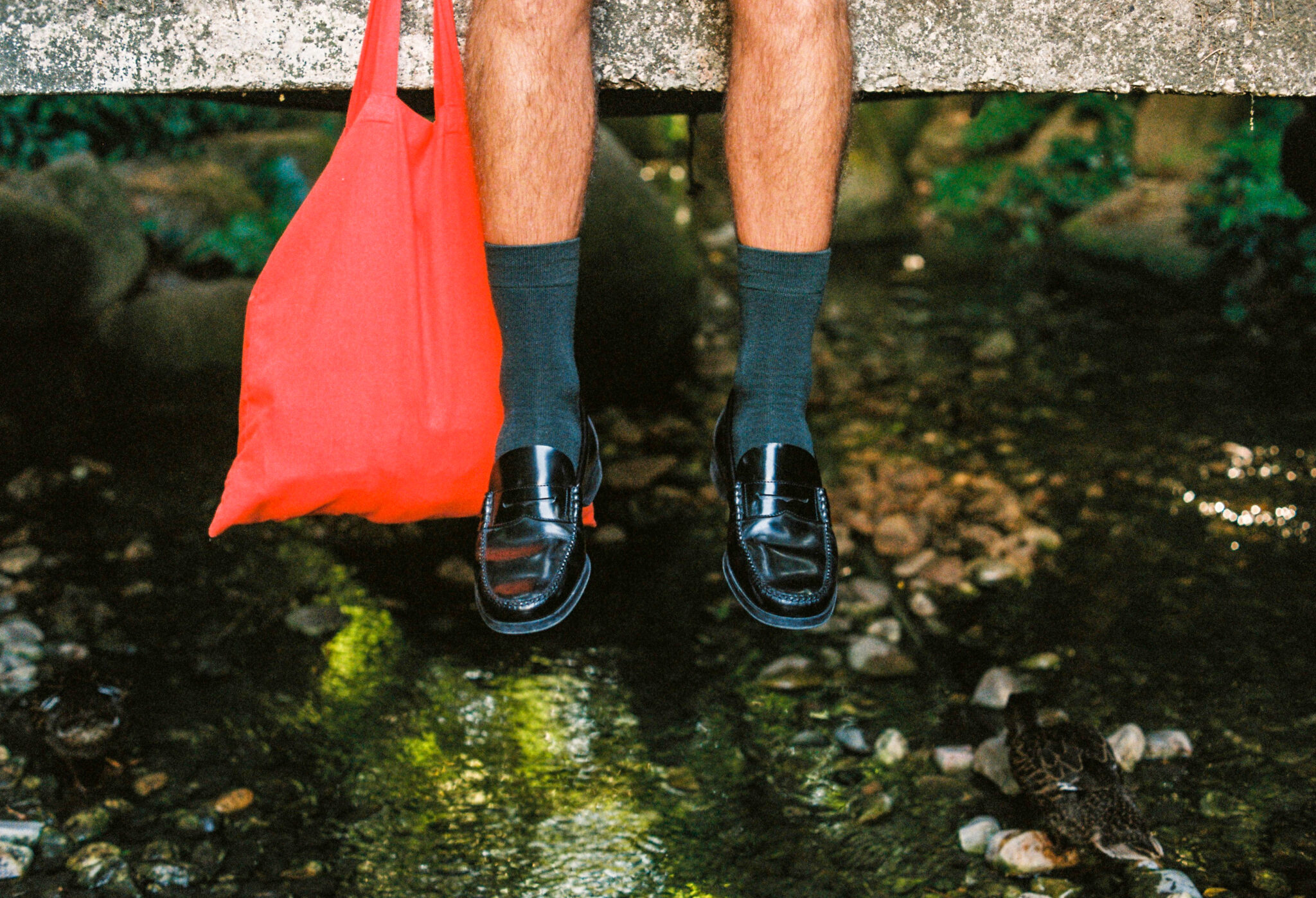
On 26 May, a few days before the release of his debut album, 22, we both met at Gulbenkian and talked a bit about everything. It was a very pleasant afternoon, which resulted in this interview that was a pleasure to write. We hope you enjoy it.
We recommend you have Narciso’s Spotify open by your side while reading the interview so that you can listen to any of the songs mentioned if wanted.
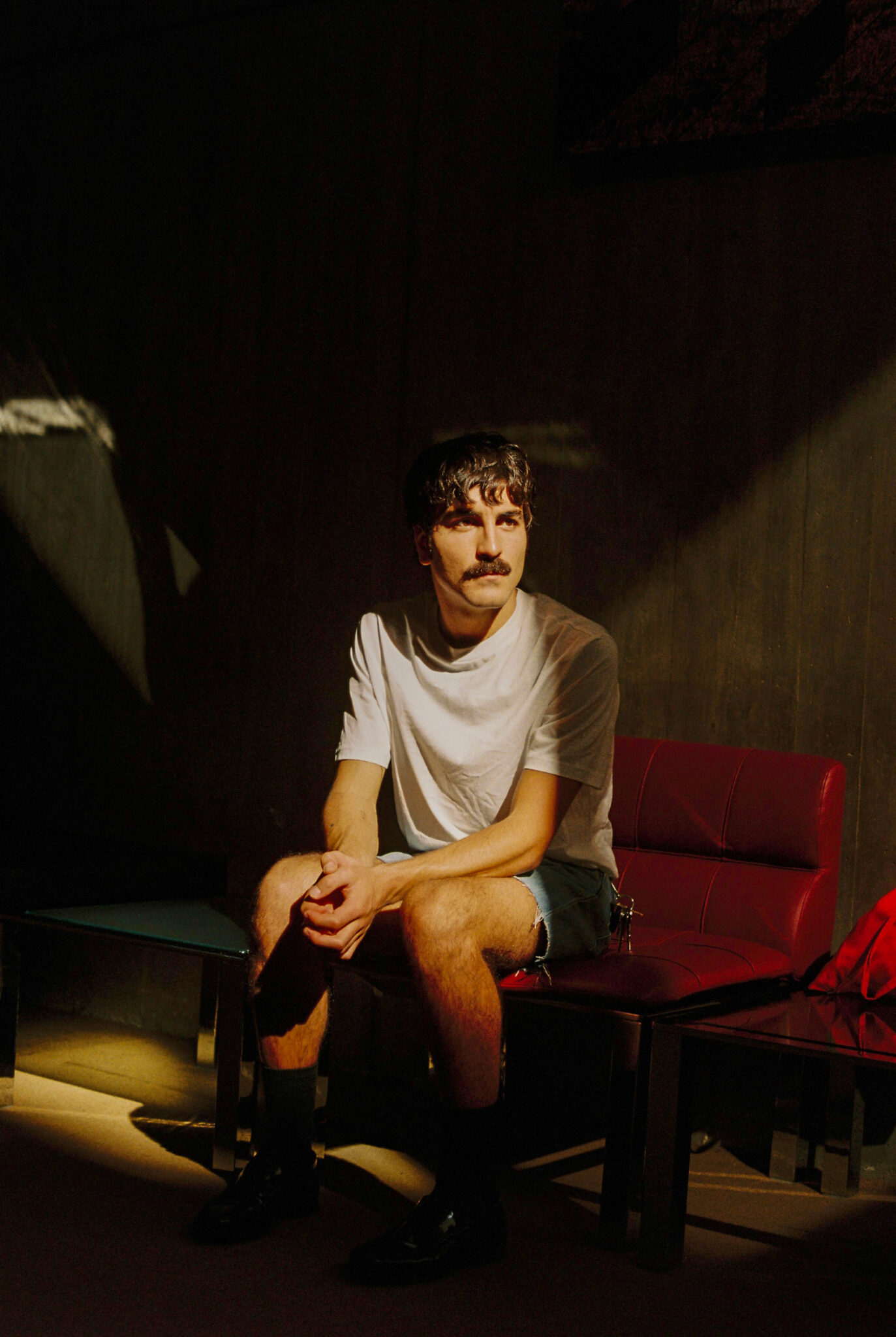
Vasco, both you and your brother grew up in Santo Amaro de Oeiras and later both became creatives and artists. What influence did your parents have on that?
That brings me to the topic of growing up in Santo Amaro. If it hadn’t been for my parents, we would hardly have followed this path in the committed and ambitious way we did. My brother and I had a constant war with my parents when we lived in Santo Amaro, which was going to exhibitions in Lisbon. They came to Lisbon a lot, to Gulbenkian where we are, to CCB, to art galleries, to classical, jazz and opera music concerts and they always made us come with them, and for us Lisbon was horrible. It was a seven-headed beast, far from everything and everyone. Having to leave Oeiras to spend a Saturday or Sunday in Lisbon was hell and we threw a lot of tantrums, but they always told us: “One day you’ll thank us”.
Around the age of 16, we started to grow up and realize that it made sense, and most likely, the fact that we had spent so much time looking at art planted some seeds that when we started studying, myself music and my brother photography, everything immediately started making sense.
Your first solo project is called Anticorpo. You’ve already described it as a vaccine against your thoughts and as the result of wanting to unload the anger and sadness that was inside you at the time. How can a cry of anger be so beautiful?
For me, Anticorpo’s songs seem to have been written for me to listen to them later and get better. But I never wrote them with that intention. I never wanted to write something light that would calm me down. I wrote music that was guided by the references I had at the time and what I was listening to was alternative fusion jazz and indie jazz, which made me feel comfortable and good. Anticorpo is an attempt to make the same music that the people I was listening to were making.


Was the process of figuring out what you wanted to present for your debut as Narciso difficult?
When I wrote the four songs on Anticorpo, I didn’t intend to release them. They were part of the final exam for my degree at the conservatory in Amsterdam. The final exam consisted of a series of assignments that we had to do, including a jazz composition and other pieces. I asked my teacher if, instead of doing all that, I could present four compositions, themes of my own, that I had written and recorded, which weren’t necessarily jazz. Surprisingly, the conservatoire agreed to my request, but they insisted that I also play the other solo jazz pieces on guitar, which I’m terrible at. I also performed a soundtrack I made for an animated film by Marta Pinto, which I consider to be one of the coolest pieces of work I’ve done.
In “My One” you sing for the first time. Was it liberating to be able to use your voice to express yourself?
No. It was stressful. “My One” is a song that I put in my head that I had to do. Someone said to me, “Your song is cool, but since it doesn’t have a voice, I can’t sell it”. Comments like I used to hear when I made instrumental music. “The music is cool, very cool. But why doesn’t it have a voice?”. So, I got it into my head that I had to make a song with vocals. Although I think the melody is beautiful, I can’t hear my voice in it. I think it’s just off to the side. And it ended up being driven by a stubborn “Oh yeah? Don’t bother me anymore, I’m going to do a song with vocals, just to satisfy you”. It was forced, but I don’t regret it because it paved the way for me to start using my voice.
Before I made the song, I already imagined what I wanted my voice to sound like and that created a lot of inner conflict, because I wasn’t getting there, and I fried a lot. With “My One” I had a lot of anxiety, and I almost broke stuff while recording it. And playing it live and rehearsing it was a panic. I’ve never heard a recording of me playing it from start to finish without switching off halfway through. So much so that I stopped performing that song live for a while.
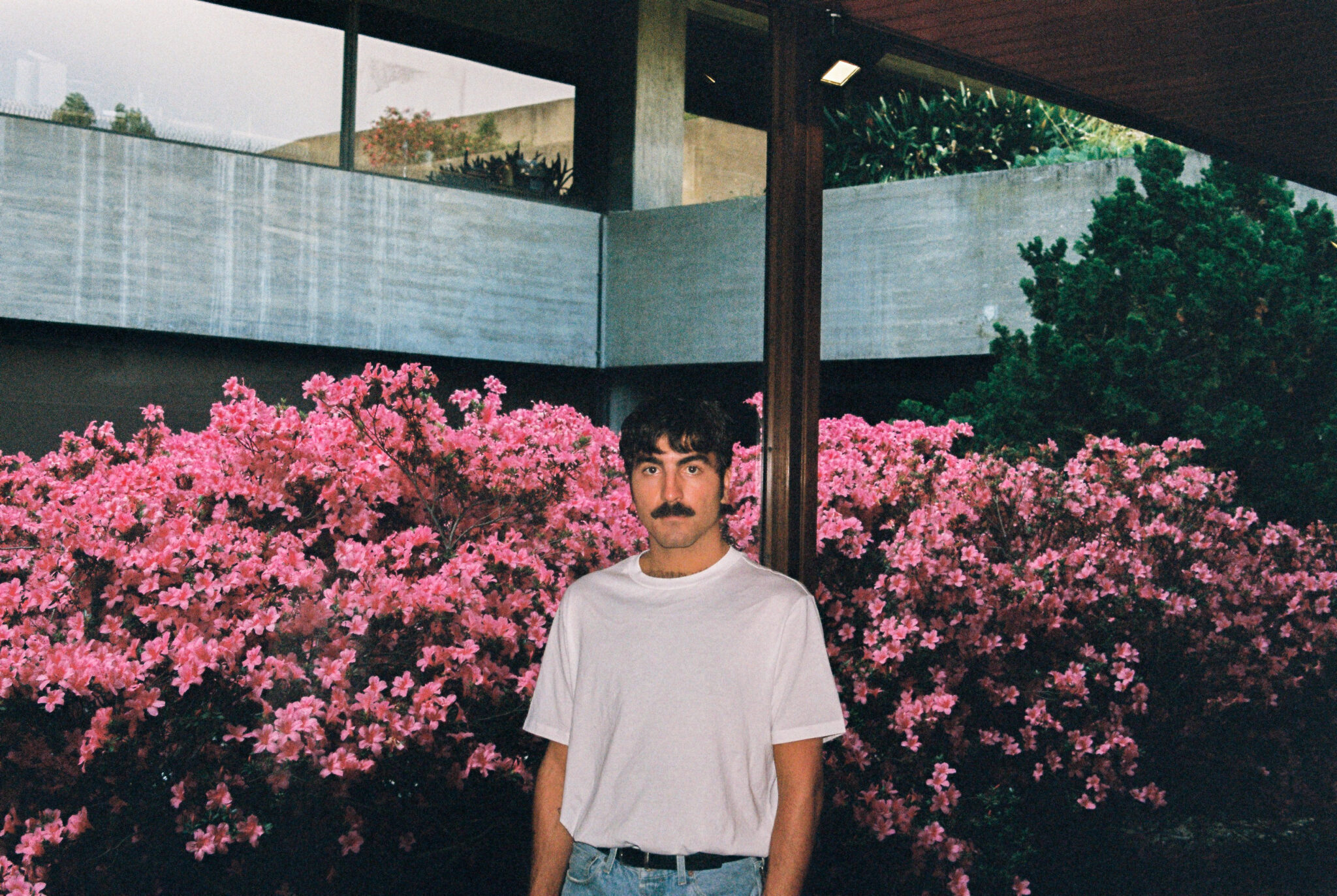
You made a beautiful video for the song. What was the idea behind the sand on the floor of the bedroom or the living room with crooked furniture and striped walls?
Well, the music video is the cool part of “My One”. I was super focused on the song and my brother and Vercesi said they wanted to make a music video for it. It was a project that came 100% from them, that they decided to do because they heard the song and liked it. They kept singing it all the time, and they had the idea of making that surreal, nonsensical video. A room where the floor is made of sand, a room where the furniture is hanging from the ceiling and everything is falling, another room where the fridge is painted and almost camouflaged with the wall, and it opens up and I’m naked inside the fridge. These are strange and incredible scenes.
The song talks about the fact that I’m thinking about someone I care about, but not only is that person not there physically, they’re not there spiritually and we’re not well connected. When you’re in that state of mind, it’s normal for ordinary things to lose a bit of color and the interest they usually have. If the chairs in the room you’re in were hanging from the ceiling and facing downwards, you wouldn’t even notice. You wouldn’t care about that. That’s how I interpret the music video.
Some people compose music at home and only perform it live afterward. You play your demos live and then finalize them at home. Why is that?
That’s the story of 22. With “My One” I composed, recorded, produced, published, and performed it live all in a row. It was a process I didn’t like at all because it felt like the music wasn’t breathing. Besides, what works playing with a band, you’ll only know when you play with that band, and you’ll only know if it works at a gig when you play a gig.
After releasing “My One” in November 2021, I decided that I didn’t want to make music like that anymore. Write the music, record it, and try to reproduce what was recorded as much as possible. I’m just going to write music, take it to rehearsals, and play it at concerts. And that was cool. The year 2022, which gave the album its name, ended up feeling like an artist’s residency spread over several places and several stages, where I tested my songs and realized where my voice was.
When I sang live for the first time, it didn’t come naturally to me. I really needed to discover something about my voice and I’m still on that journey, and I feel that I’m a little closer to what I think is my way of using my voice. Several times it was scary and humiliating because I sang so badly, but it’s been an important journey.
22 is made up of songs I wrote last year about different episodes and states of mind throughout my life. This project ended up becoming an exercise in searching for my way of writing and my way of using my voice.
“My One” by Narciso.
Film by Francisco Narciso and Pedro Vercesi.
Your brother has already made two short films called “Plastic” and “Fragile“. You did the soundtrack for both films. You also worked with Francisco on the Moda Lisboa 2022 campaign. How did this working relationship come about?
My brother and I have always been very different. We didn’t have the same friends; we didn’t hang out in the same places, and we didn’t have the same ideas or references. When I started studying music and Francisco’s photography, there was an immediate bond. Suddenly, we were both working on art, and we realized that we both had something cool to say and that if we got together, we’d be able to complement and potentiate each other.
Working together was important and it all started with the first photo shoot we did in IADE’s studio. My brother was starting in photography and needed someone to model for him, so he photographed me. I enjoyed it, and he loved it. There was an immediate bond between us when Francisco got behind the camera with me on set.
Do you have fun on stage?
Yes, but it’s fun that remains on stage. That’s why I think people get drunk and take drugs after concerts. You’re in such a hype that stays on stage and doesn’t come back with you to backstage. It’s a mix between fun and a trance-like state in which you hear the sound, feel it coming out into the audience and you know you’re the one in control of what happens. Now think, if I like the sound of my guitar in a rehearsal room, imagine on stage.
After any gig I play, I need to be alone for a while. I talk to my band, but I don’t like going out into the crowd. I need to have at least 10 to 20 minutes in which I drink a beer and smoke a cigarette alone just to come back down to earth.
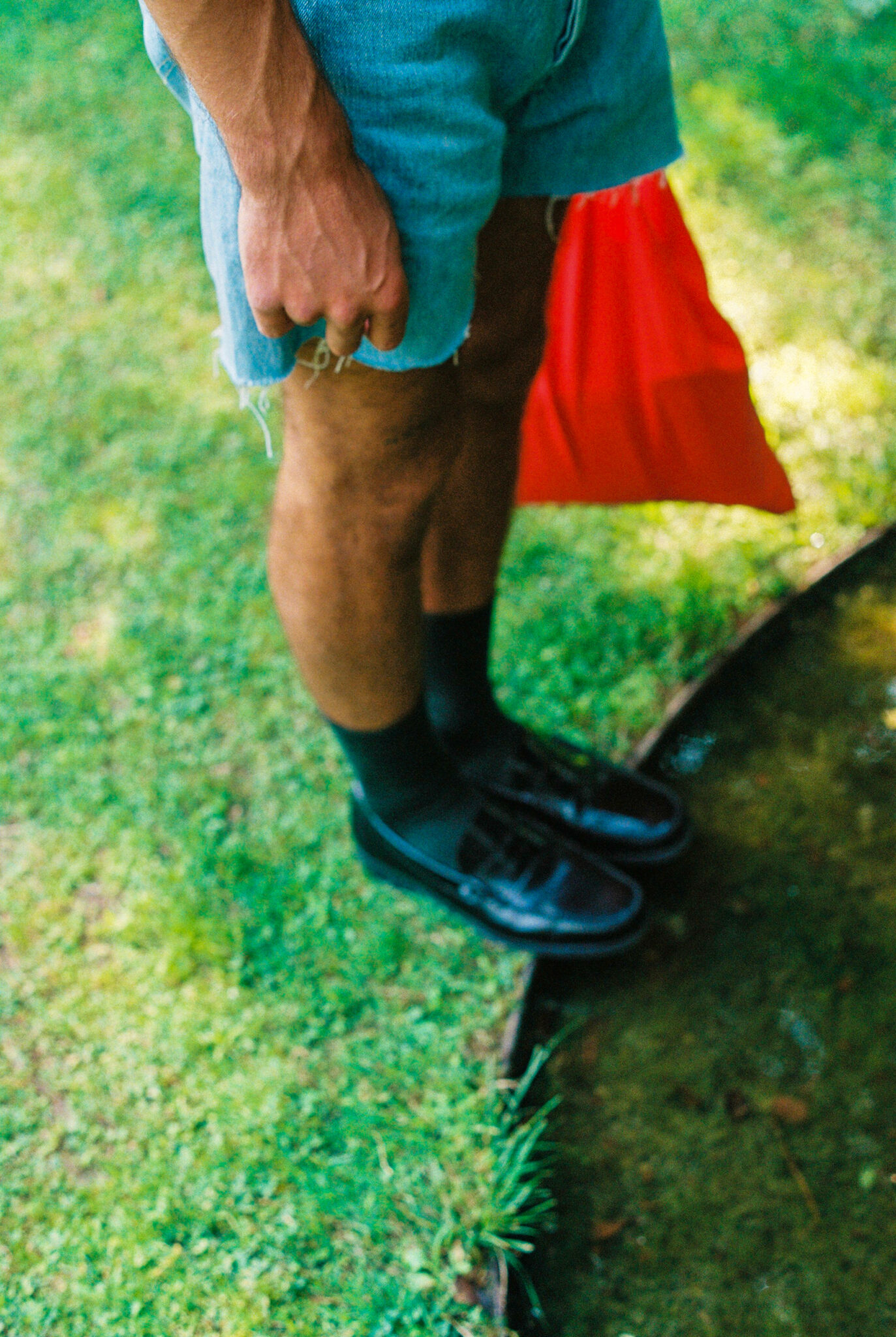
22 was recorded throughout 2022 in Lisbon, London and Amsterdam. How important was it for you to be in different cities recording and composing this project? Was it cathartic to return to Amsterdam?
I spent three months in London to be in a city where I could concentrate better and where I could be amid more interesting opportunities. As well as being very focused on finishing the album, I met an interesting person there to mix it. In London the pace of work is different, and that pressure did me good during those three months because I worked on the album every day, in a way that I wouldn’t have done in Lisbon. If I’m in the right mindset, that rhythm really stimulates me. I worked and recorded a lot every day. Those were the three months in which I perfected and discovered more about my voice. What’s more, being in an environment where English is the main spoken language stimulated and changed my writing.
Amsterdam was a stay of reconciliation. After everything that happened when I was studying in Amsterdam, I didn’t think I’d ever want to set foot there again. At a certain point, when I was in London, I started to get a bit constricted as I started to run out of money and couldn’t get the documents to be able to have a legal job. At that point, being in London began to make no sense to me, but I didn’t want to go to Lisbon straight away because I still needed a bit more of Europe, so I decided to go to Amsterdam without rushing and with no big aim, where I was very well received at my friend Giacomo’s house.
Giacomo is a great drummer and I’d been thinking about recording drums for 22 for a while, so this was the perfect opportunity because Giacomo had a great studio to record in and had all the time in the world to spend with me. I was there for two weeks during which I saw my friends again whom I hadn’t seen since 2020, had fun with them, made peace with the city, and recorded drums. Amsterdam was perfect and it was the final phase of recording the album.
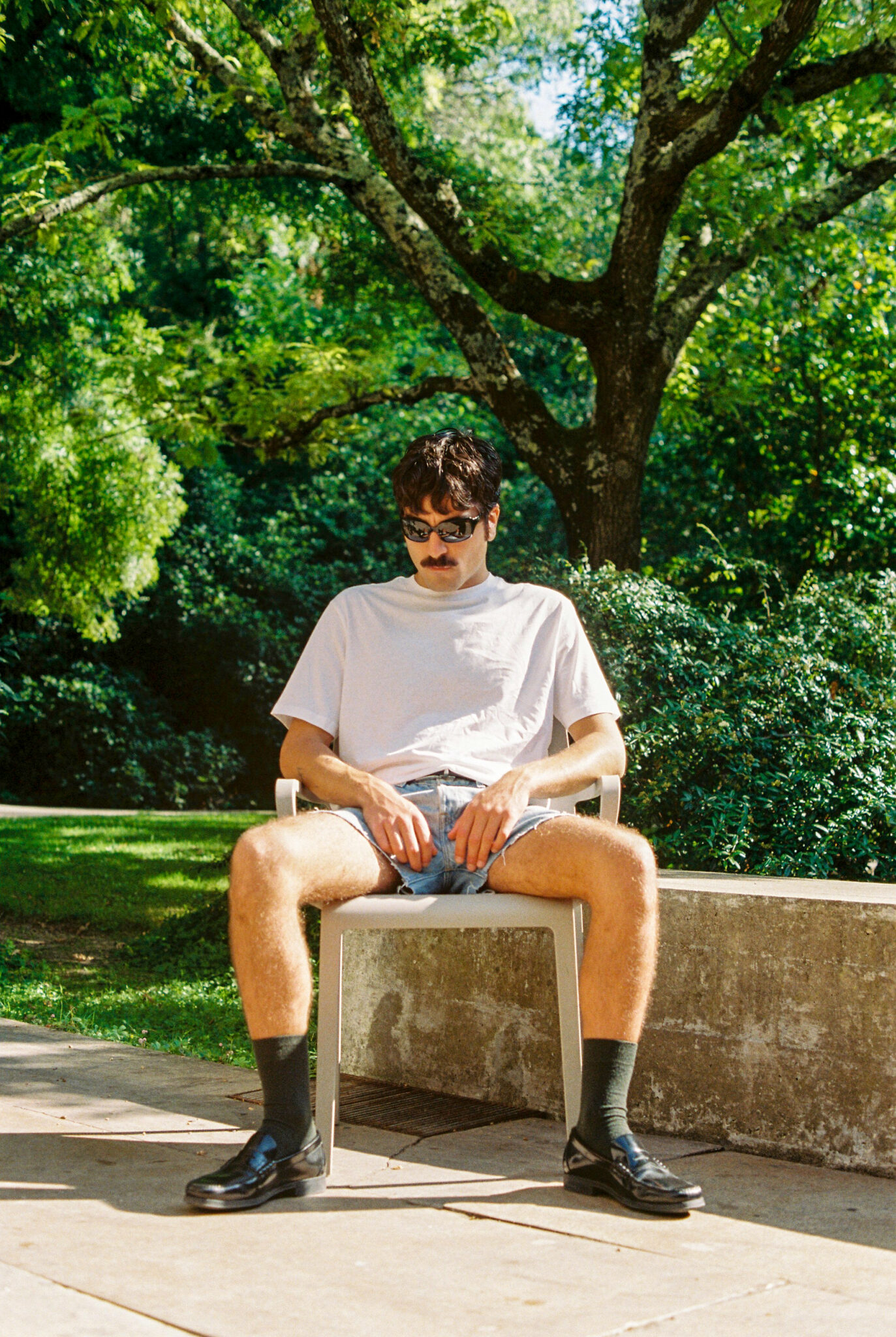

You’ve mentioned a lot the use of handmade recordings in this project. If I’m not mistaken, these recordings are pieces of your daily life that you’ve added to the album, right? With what intention?
This is related to a new project I’m doing, but I haven’t quite worked out if it’s Narciso or if it’s going to have another name. It’s a project geared towards a more cinematic thing.
The conversations of the people next door fascinate me, and I love coming across someone’s conversation as I walk down the street. I’m very interested in those bits of other people’s lives that pass by me that I have nothing to do with, but which could make a film. A film in which people write the script and not me. And it’s not just what people say. It’s the sound because when you record with your iPhone there’s a whole sound environment around you. Whether it’s a car passing by, an airplane, or a glass and cutlery banging on a table. I imagine a lot of music in those sounds, in that rhythm, and I really enjoy playing over these sounds. In this new project I’m doing, I play audios of people talking and then improvise over them. 22 has various audios that I’ve collected. In “Lounge” it’s more obvious, in “You’ll Be Fine” there was an audio of me washing the dishes, but that was removed. “Não” also has an audio of a street conversation next to Vago, in which a friend of mine, Carolina Fontes, was talking and I decided to start recording and it was right at the moment when she said: “I’m sure I’ve never been in love until today, but now I am”. But she said it with perfect direction and intention and even the record that was playing at Vago had a flute line that fitted perfectly with the instrumental of “Não”. In “Bye”, you can also hear a recording of me walking by Alqueva.

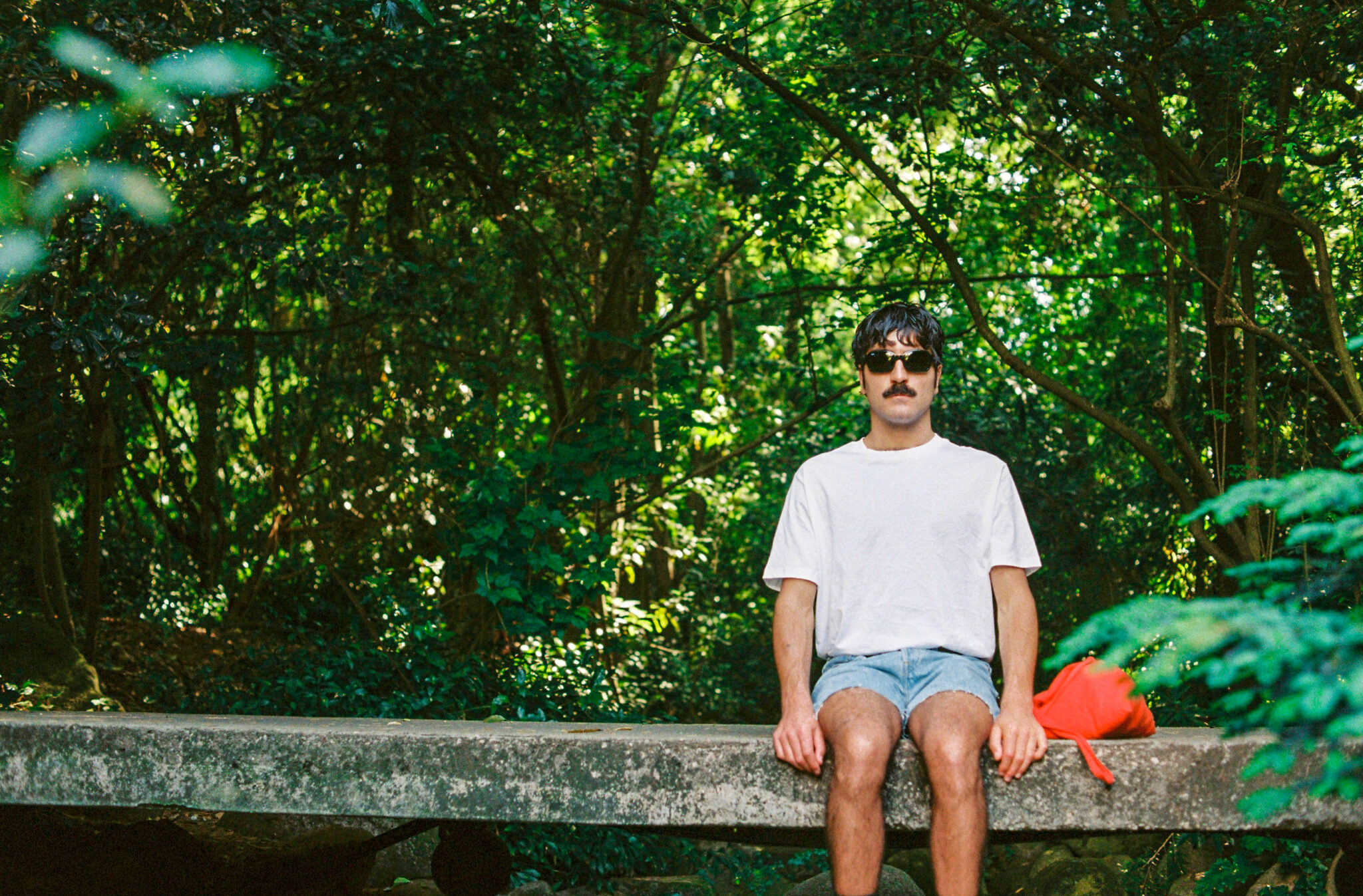
Bandcamp is a platform where any artist can sell their music and merchandise directly to their fans. Both the singles “In My Head” and “Bye” were released earlier on Bandcamp than on Spotify, which is unusual in Lisbon’s music scene today. What made you take that decision?
I use and pay for Spotify, but I hate their business model. It’s become normalized for the average consumer to pay a bargain to listen to almost all the music that exists in the world. I don’t think it’s right, especially for artists like me, who are young, have nothing, and need some strength to keep them motivated. As well as having no financial return on Spotify, you also have no human return because there’s no interaction with fans. On Bandcamp, on the other hand, there is interaction, you know who follows you and the artist is like a user who publishes music, who can make posts and interact with other people. The platform also has radio programs, interviews, and articles. Bandcamp, unlike Spotify, is a platform for music, by music, and for people who make and consume music.
At the same time, I’m tied to Spotify. If I want people to listen to my music, I must put it there. And there are various ways around that, but I don’t believe that not putting my music on Spotify is a solution, because then nobody will listen to what I do. However, I rarely share my Spotify links, and the main link I share is always the Bandcamp one.
I released “In My Head” on Bandcamp before I released it on Spotify, and I made more money from one song in a week than I did from Spotify in three years. When I released “Bye” on Bandcamp, I was in Alentejo and it was Sunday night. I made an Instagram post at a shitty hour, banned for the algorithm, and at the time I had eighty or ninety likes and that was exactly the number of plays I had on Bandcamp. And that means a lot. It means that I have 80 people who saw and read my post, clicked on the link, and listened to my music. For me that’s the beauty of Bandcamp, the transparency that exists between listeners and artists.
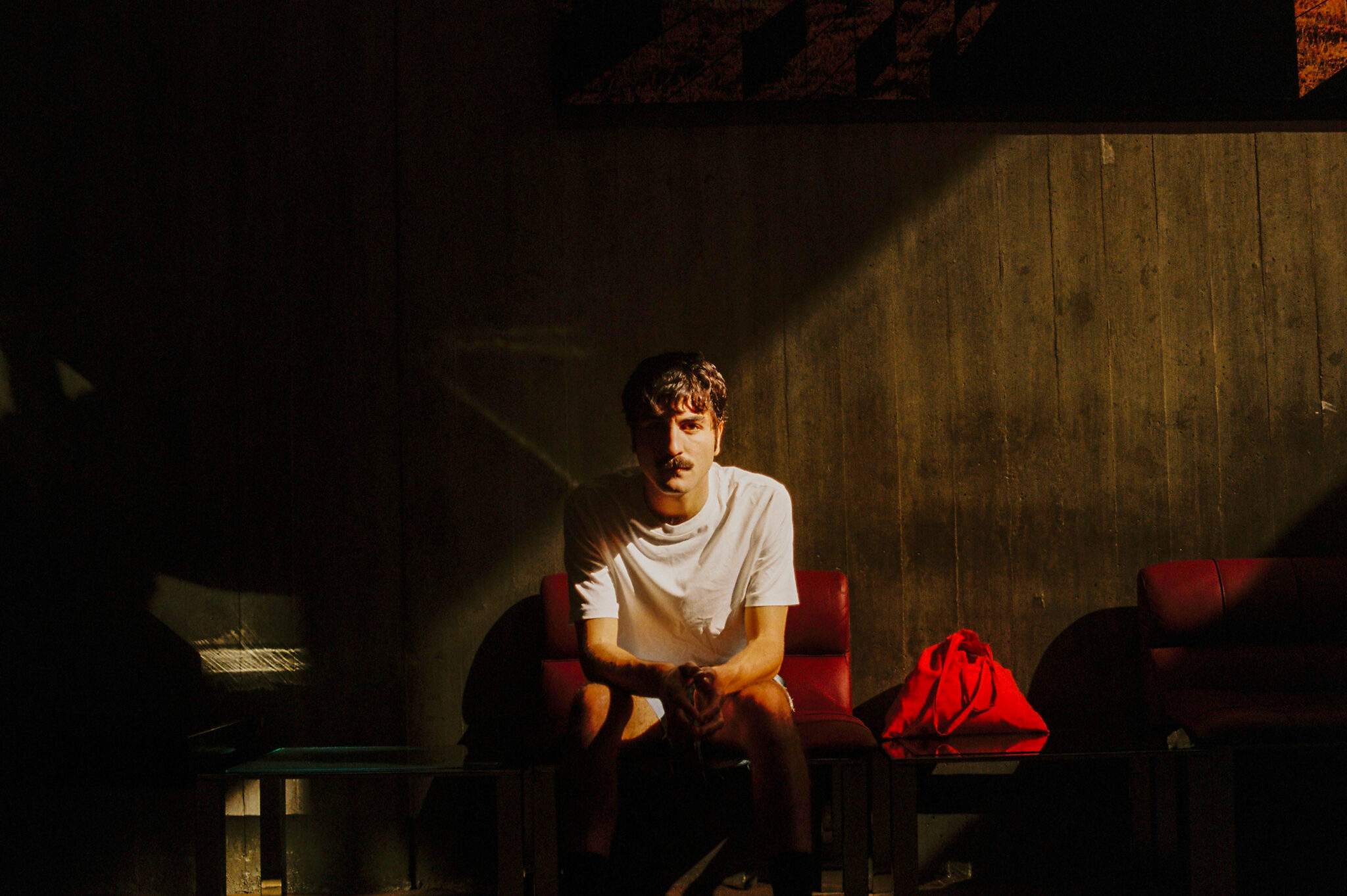

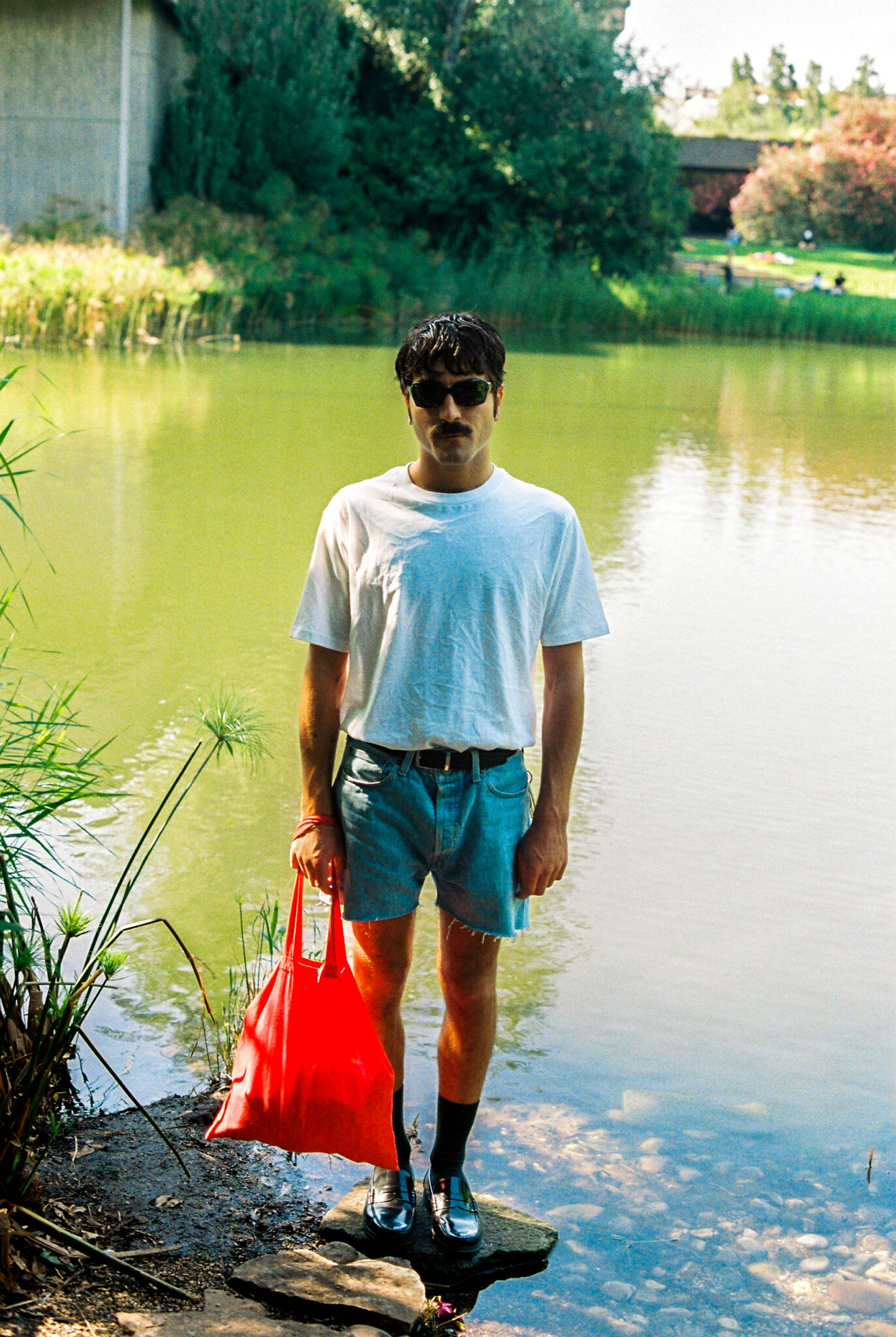
Joaquim Quadros ends the press release for 22 with: “Just like this record, which says everything about the human side of a musician who is best found organizing himself into songs.” Are you resigned to life’s eternal discomfort?
I think that’s what it is. In a way, all the traumas I’ve been through throughout my life, which have led me to do a lot of therapy, are teaching me how to deal with life’s discomfort. The truth is that I’ve been uncomfortable for a long time. Sometimes you start to think that the solution, instead of not being uncomfortable and doing 30 one-liners in order not to be, is to take on the discomfort. Discomfort is eternal and normal. It’s also a great source of creation and many beautiful things in life. It also brings people together and creates a lot of happiness. If there’s no discomfort, you won’t value what’s good as much either. That’s it.

